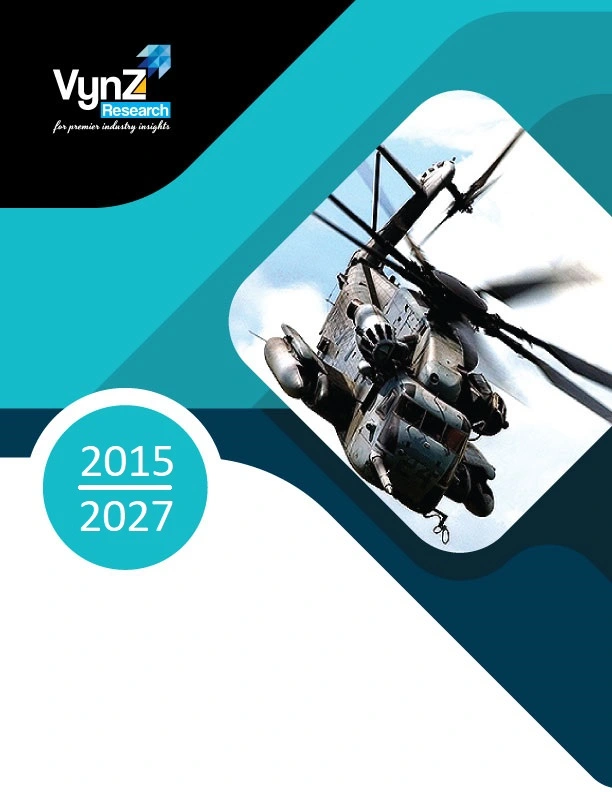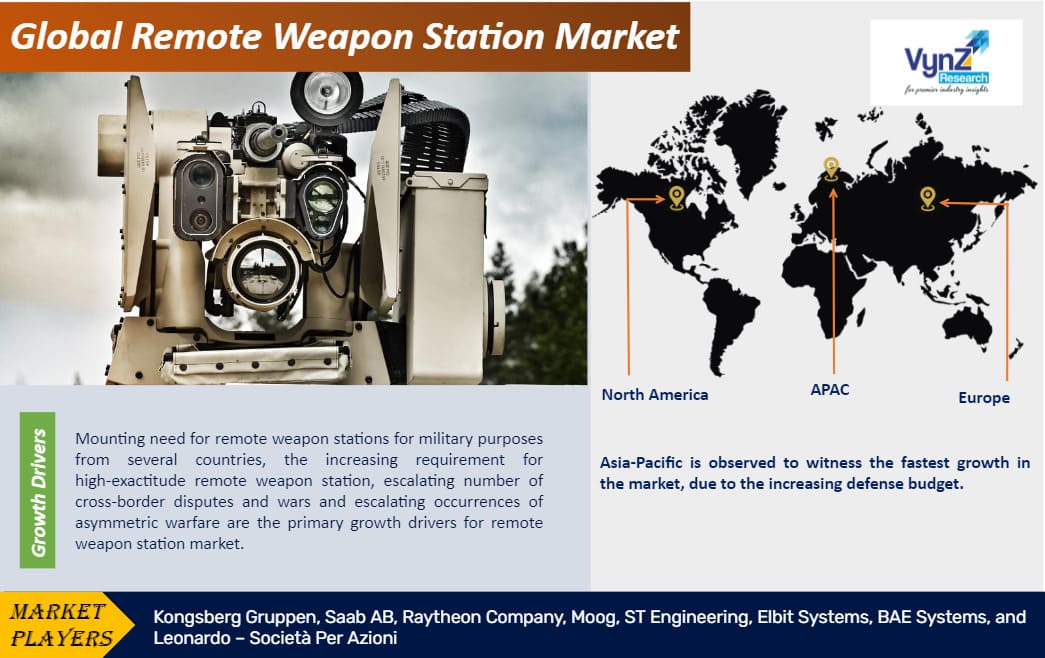| Status : Upcoming | Report Code : VRAD12002 | Industry : Aerospace and Defense | Available Format :

|

Global Remote Weapon Station Market – Analysis and Forecast (2025-2030)
Industry Insights by Application (Military and Homeland Security), by Platform (Naval, Airborne and Land), by Component (Sensors, Weapons & Armaments, Human Machine Interface), by Weapon Type (Lethal Weapons and Non-Lethal Weapons), and by Technology (Close-in Weapon Systems, Remote Controlled Gun Systems and Others)
Industry Overview
Remote Weapon Station is a remotely operated weaponized system. The mounting need for remote weapon stations for military purposes and the mounting requirement for high-exactitude remote weapon stations are the factors driving the growth of the global remote weapon station. The market has witnessed high demand for the land segment in the coming years due to the mounting requirement for remote weapon stations, escalating emphasis on combat systems, and the upgradation of current armoured platforms.

Remote Weapon Station Market Segmentation
Insight by Platform
On the basis of the platform, the market is subdivided into naval, airborne and land. Of all the platforms, the land segment accounted the largest share and is expected to grow at the fastest rate in the market due to the mounting requirement for remote weapon stations, escalating emphasis on combat systems, upgradation of current armored platforms, demand for connected warfare systems, and protection of soldiers in war-like circumstances.
The land segment is further subdivided into main battle tanks, armored fighting vehicles, and others. Moreover, the naval segment is further subdivided into offshore patrol vessels, corvettes, frigates, and others. In addition, the airborne segment is further subdivided into fighter aircraft, helicopters and others.
Insight by Component
On the basis of the component, the market is subdivided into sensors, weapons & armaments, and human-machine interface (HMI). The usage of the sensor fusion technology and the sensor suite are the factors growing the demand of sensors segment. Among all components, the sensor is expected to grow at fastest rate in the remote weapon station market.
The weapons & armaments are further subdivided into missiles or rockets, direct energy weapon, and guns. In addition, the sensor segment is further subdivided into thermal imagers, day imaging systems and laser rangefinders (LRF).
Insight by Weapon Type
On the basis of weapon type, the market is subdivided into lethal weapons and non-lethal weapons. Easiness of integration, faster configuration, and easiness of operation and guiding are the factor growing the demand of lethal weapons segment. Among the all weapon type, the lethal weapons segment accounted the largest share in the market. The lethal weapons are further subdivided into medium caliber and small caliber.
Insight by Technology
On the basis of technology, the market is subdivided into close-in weapon systems (CIWS), remote controlled gun systems and others. Mounting research & development activities for the enhancement of innovative technologies and the improved reliability operations of weapon systems are the factors growing the demand of the hardware segment in the market. Among all technologies, the close-in weapon systems (CIWS), segment is expected to grow at the fastest rate in the remote weapon station market.
Insight by Application
On the basis of application, the remote weapon station market is subdivided into military and homeland security.
Global Remote Weapon Station Market Report Coverage
|
Report Metric |
Details |
|
Historical Period |
2018 - 2023 |
|
Base Year Considered |
2024 |
|
Forecast Period |
2025 - 2030 |
|
Market Size in 2024 |
U.S.D. XX Billion |
|
Revenue Forecast in 2030 |
U.S.D. XX Billion |
|
Growth Rate |
XX% |
|
Segments Covered in the Report |
By Platform, By Component, By Weapon Type, By Technology, and By Application |
|
Report Scope |
Market Trends, Drivers, and Restraints; Revenue Estimation and Forecast; Segmentation Analysis; Impact of COVID-19; Companies’ Strategic Developments; Market Share Analysis of Key Players; Company Profiling |
|
Regions Covered in the Report |
North America, Europe, Asia-Pacific, Middle East, and Rest of the World |
Industry Dynamics
Industry Trends
Technological advancements such as integrated remote weapon systems, advanced gun systems, directed energy weapon systems, next-generation sensors, smart ammunition, and counter-directed energy weapon systems are the key trends observed in the remote weapon station market.
Remote Weapon Station Market Growth Drivers
Mounting need for remote weapon stations for military purposes from several countries, the increasing requirement for high-exactitude remote weapon station, escalating number of cross-border disputes and wars and escalating occurrences of asymmetric warfare are the primary growth drivers for remote weapon station market.
Continuing military upgrading programs in several countries across the globe, escalating emphasis on the naval subdivisions in emerging countries, and novel land warfare systems are also facilitating the growth for the remote weapon station market.
Remote Weapon Station Market Challenges
The difficulty involved in the incorporation of remote weapon stations with a wide variety of platforms and elevated development price of steadied remote weapon stations are the major challenges for the growth of remote weapon station market.
Remote Weapon Station Market Industry Ecosystem
Globally, the manufacturing companies trying to enter the remote weapon station market are required to maintain stringent regulatory standards. Moreover, the high level of capital requirement is a major barrier for the entry of new players. This offers an edge to the established players in the industry competition.
Remote Weapon Station Market Geographic Overview
Geographically, Europe accounted for the largest share of the market due to the constant advancement of warfare platforms with the latest technologies. In addition, the increasing occurrence of armed conflicts or war against terrorism are the factors driving the growth of the European remote weapon station market.
Asia-Pacific is observed to witness the fastest growth in the market, due to the increasing defense budget. In addition, China accounted for the largest share in the Asia-Pacific remote weapon station market, due to mounting research and development activities, for the progress of technology-based designs of remote weapon stations.
Remote Weapon Station Market Competitive Insight
Kongsberg Gruppen is an international technology group headquartered in Norway, that supplies high-technology systems to customers in the merchant marine, defence, aerospace, offshore oil and gas industries, and renewable and utilities industries.
Saab serves the global market with world-leading products, services and solutions from military defence in all domains to civil security. Saab’s market offering is broad and consists of complex systems involving extensive research and development as well as services with a high degree of repetition. With operations on every continent, Saab continuously develops, adapts and improves new technology to meet customers’ changing needs.
Key players in the remote weapon station market are catering for the demand for these devices by investing in technologically advanced products in their product portfolio across the globe. Kongsberg Gruppen, Saab AB, Raytheon Company, Moog, ST Engineering, Elbit Systems, BAE Systems, and Leonardo – Società Per Azioni are the key players offering remote weapon stations.
Recent Developments by Key Players
Patria has signed a contract with Kongsberg Defence & Aerospace (‘Kongsberg’) for the delivery of PROTECTOR remote weapon stations to more than 300 Sweden’s and Finland’s Patria 6x6 vehicles within the Common Armoured Vehicle System (CAVS) programme.
Defence companies Raytheon and Lockheed Martin collaborated for javelin which is a portable anti-tank weapon. It is shoulder-fired but can also be deployed from multiple platforms installed on tracked, wheeled or amphibious vehicles.
Frequently Asked Questions
Purchase Options
Latest Report
Research Methodology
- Desk Research / Pilot Interviews
- Build Market Size Model
- Research and Analysis
- Final Deliverabvle
Connect With Our Sales Team
- Toll-Free: 1 888 253 3960
- Phone: +91 9960 288 381
- Email: enquiry@vynzresearch.com
Remote Weapon Station Market
